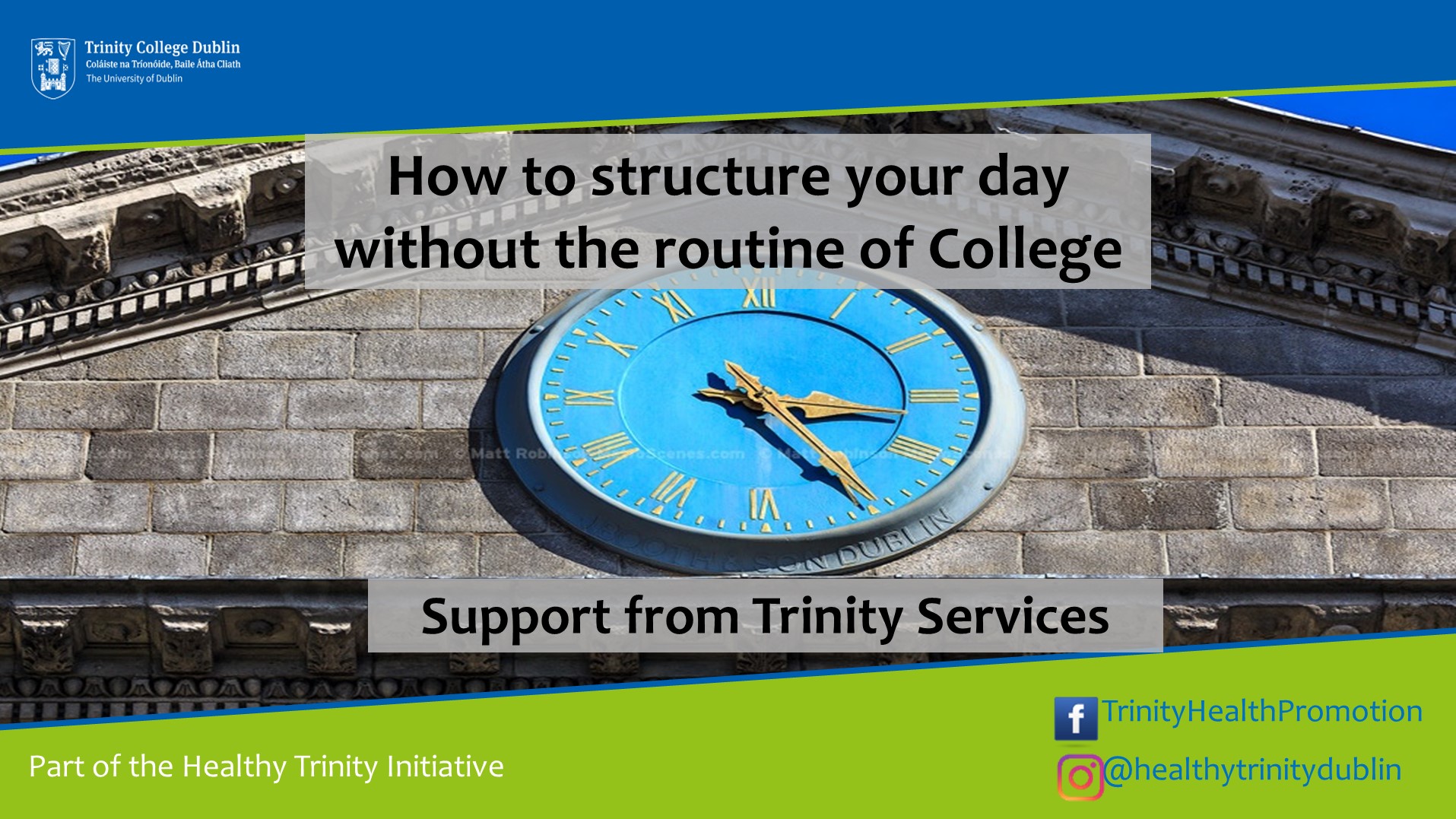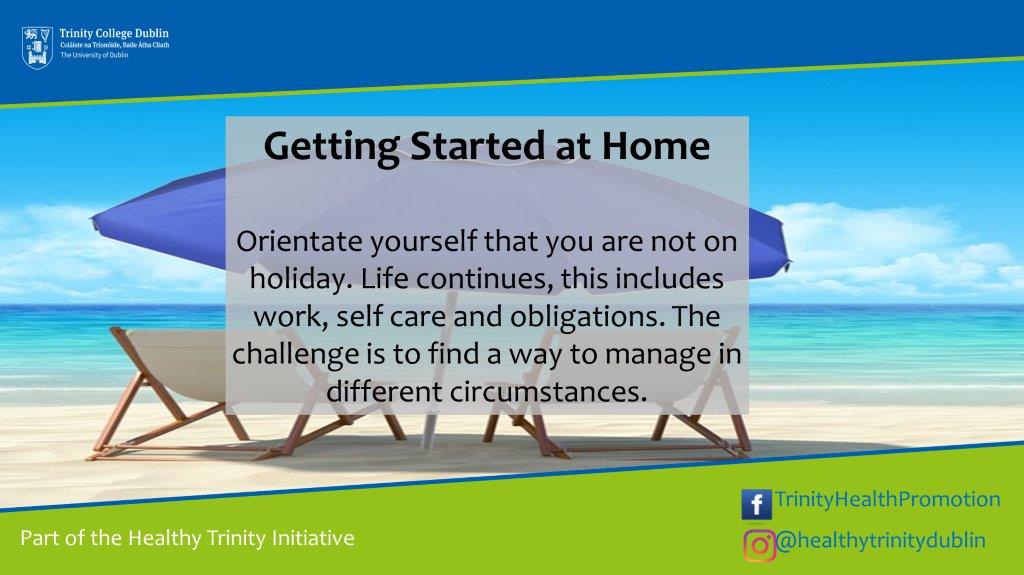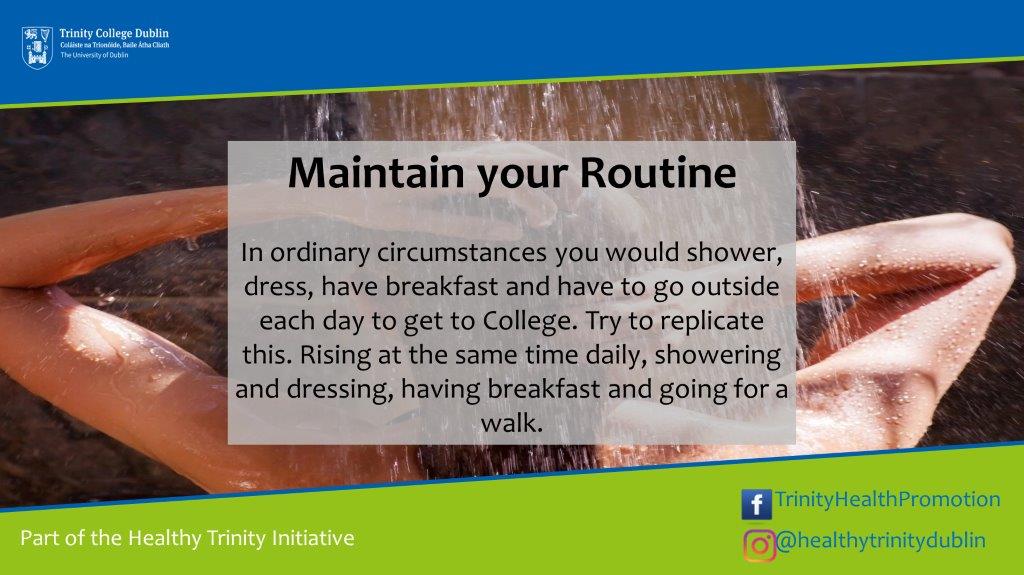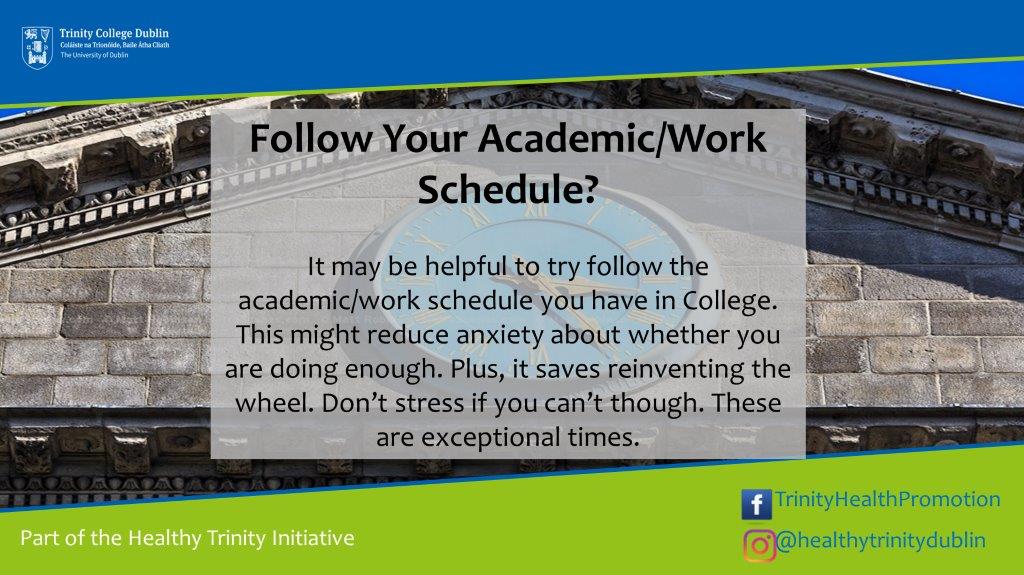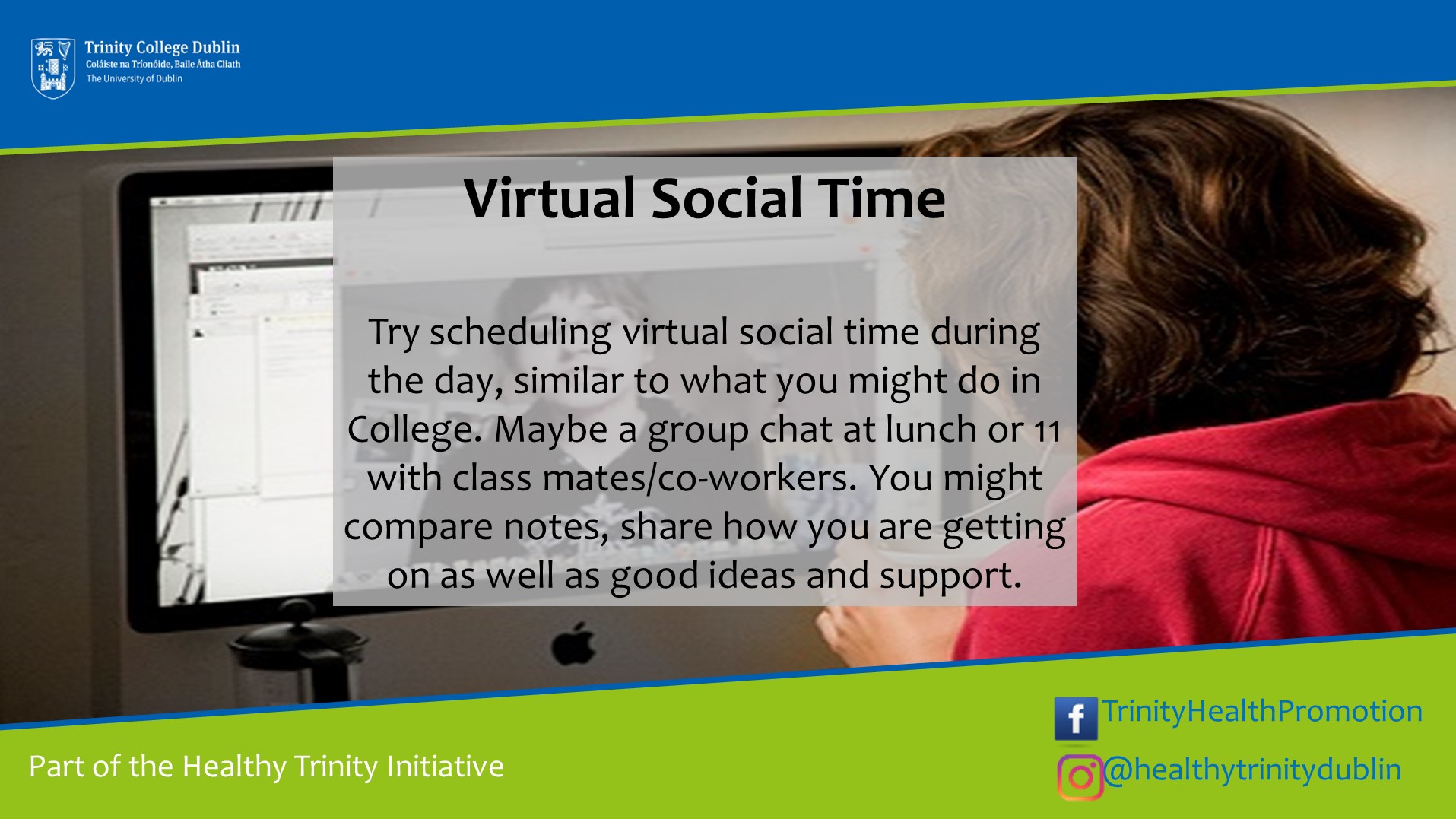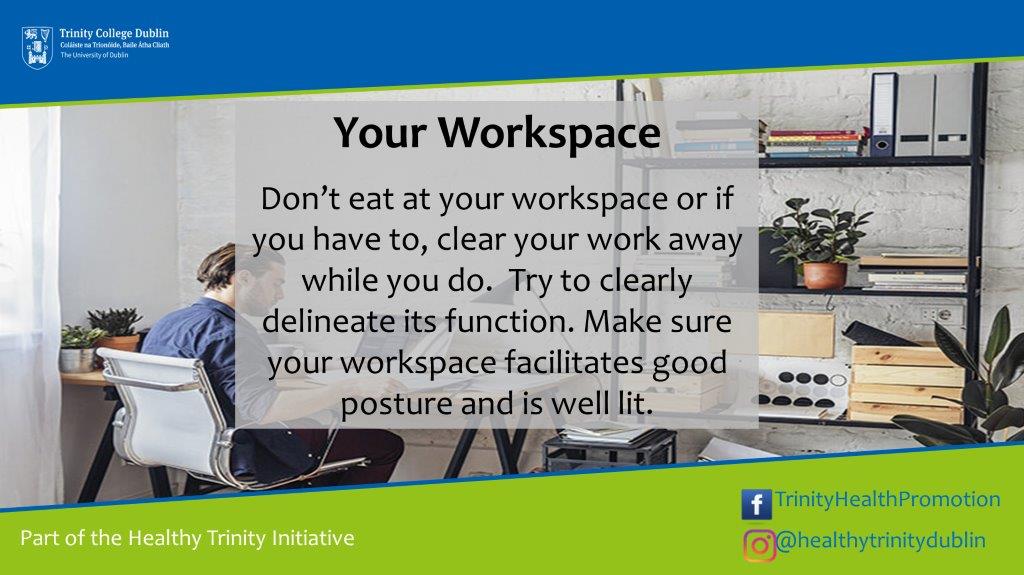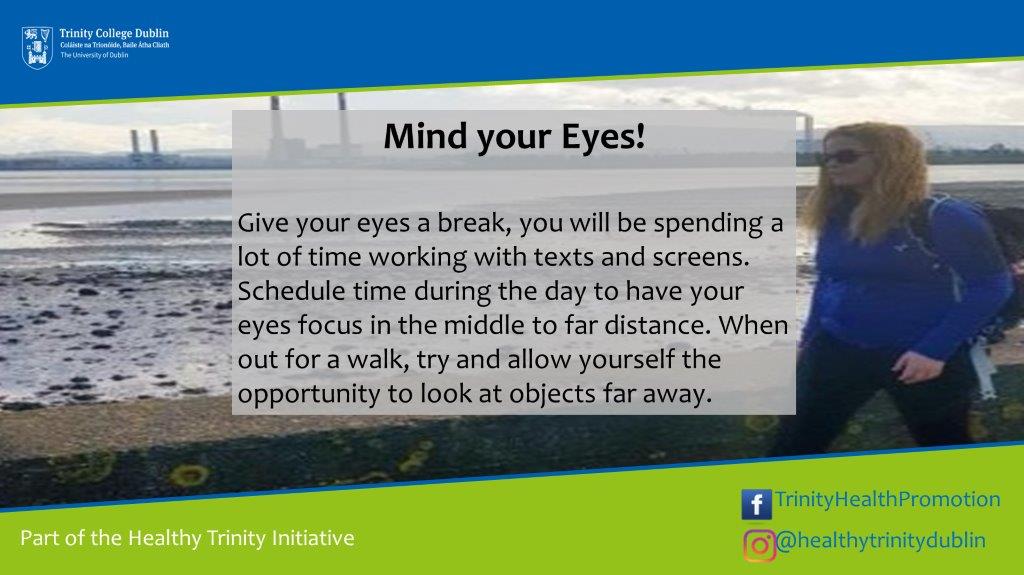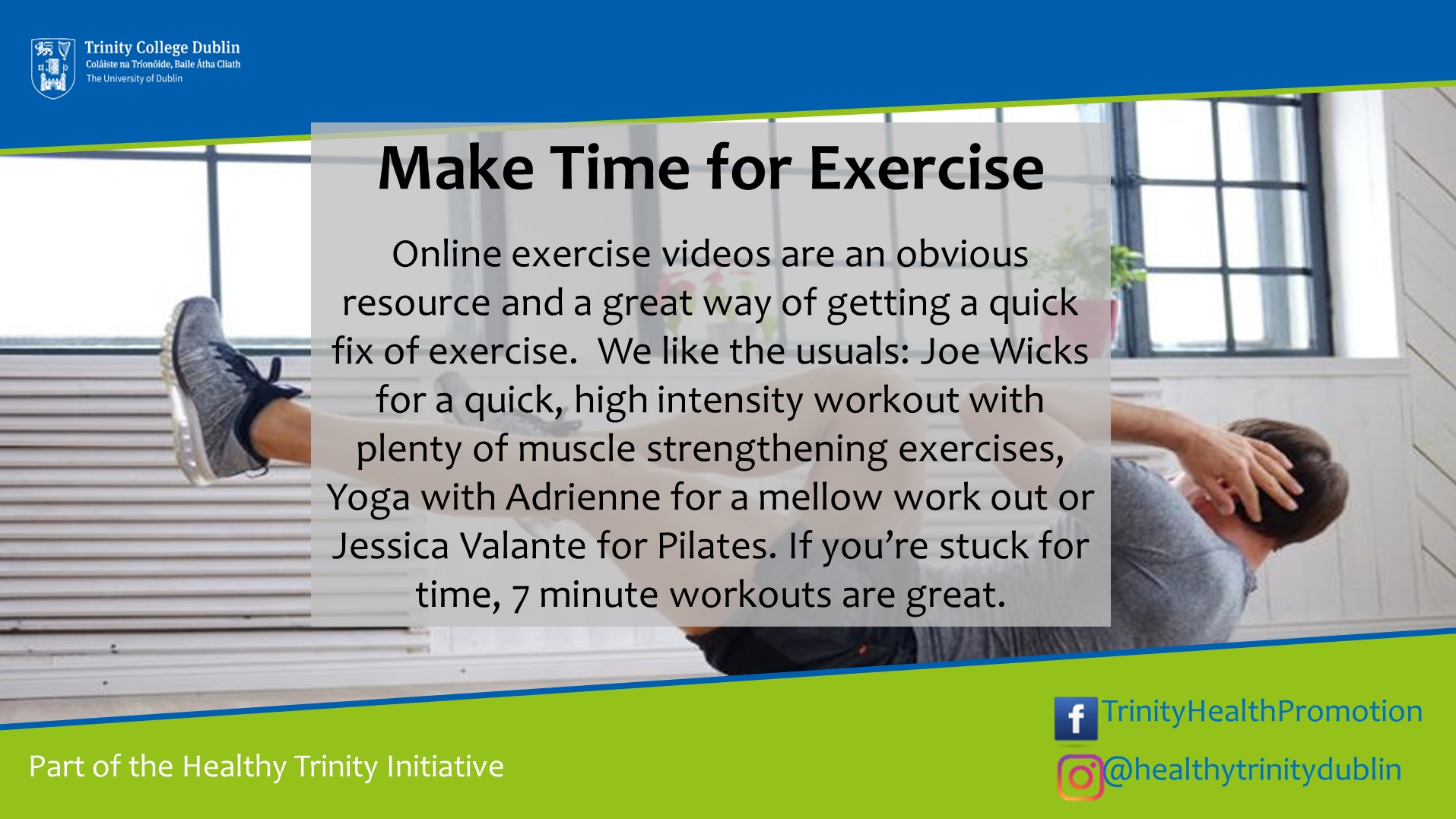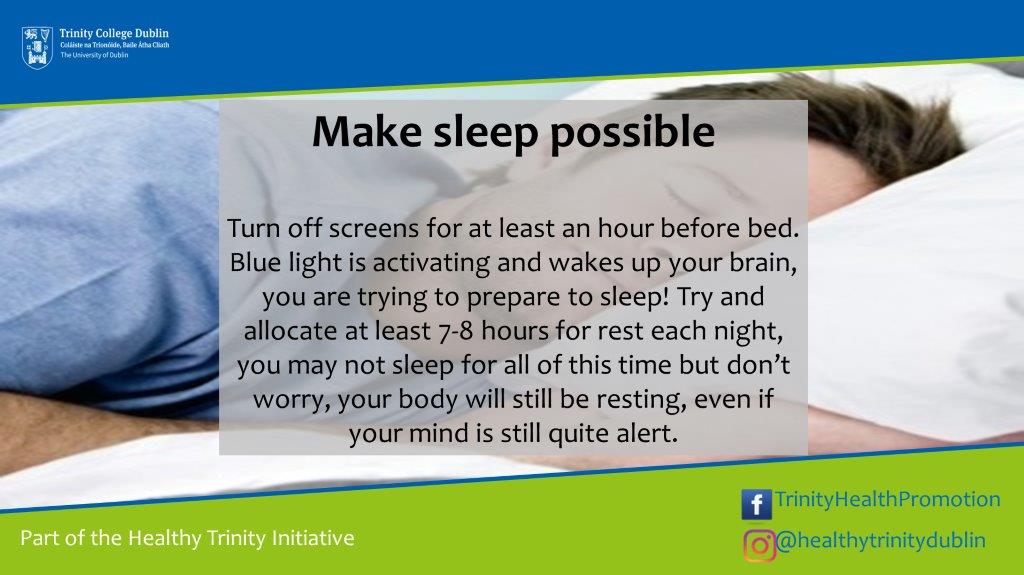How to Structure your day without the routine of going to Trinity
Many people are daunted at the prospect of life without the usual routine of Trinity. Here are some tips from the College Health Service team on how to stay healthy.
Getting started at home
To start, orientate yourself in the same way you would do for any working day. Life continues, this includes work, self-care and obligations. The challenge is to find a way to manage in different circumstances.
Maintain your routine
In ordinary circumstances you would shower, dress, have breakfast and have togo outside each day to get to Trinity. Try to replicate this routine. Rising at the same time daily, showering and dressing, having breakfast and getting out for a walk.
Should you follow your academic/work schedule?
It may be helpful to try and follow the academic/work schedule you have in Trinity. By doing this you might reduce your anxiety about whether or not you are doing enough and you also will not have to reinvent the wheel. You may find that this does not suit you. Do not be afraid then to try and create a schedule that works better for you. It is probably helpful to set this out in a timetable.
Virtual Social Time
Try scheduling some virtual social time during the day, similar to what you might do in work. Maybe schedule a group chat at lunch time or 11.00 with colleagues. It might be a time to compare notes, how you are getting on, share good ideas, and get support. Whatever technology suits is best but Skype, Microsoft Teams, Zoom all allow multiple users to video chat. Use these methods to connect on work related matters too in order to maintain good working relationships.
Your workspace
Don’t eat at your workspace or if you have to, clear your work away while you do. Try to clearly delineate its function.
Ensure you have good ergonomic practices including i.e., proper computer set up, monitor positioning, rest breaks and engineering or ergonomic controls (i.e., furniture design, lighting, glare control, computer workstation configuration and layout).
Mind your Eyes and Ears!
Give your eyes a break, you will be spending a lot of time working with texts and screens. Schedule time during the day to have your eyes focus in the middle to far distance. When out for a walk, try and allow yourself the opportunity to look at objects far away. This is really only achievable in the outdoors. Give your ears a break, take off audio devices when out walking and again try and allow your brain absorb sounds from the environment rather than forcing auditory input. This will facilitate mindfulness.
The end of the working day
Make a distinction between the working day and the end of the day. Clear up your work station and put your work away.
This is often a good time to tidy your area, do laundry, go for a short walk etc. These physical activities activate a different part of your brain that you are not actively using when you are doing your work. Whilst doing this, your brain is starting to unwind.
Wind down before bed
Allow around an hour to wind down before bed. Try and avoid exercise too close to bedtime.
Turn off screens for at least an hour before bed. Blue light is activating and wakes up your brain, you are trying to prepare to sleep! Try and allocate at least 7-8 hours for rest each night, you may not sleep for all this time but don’t worry, your body will still be resting, even if your mind is still quite alert.
Make time for exercise
Physical activity boosts self-esteem, mood, sleep quality and energy, as well as reducing your risk of stress and depression. 30 minutes per day of exercise that leaves you out of breath is recommended and don’t forget to incorporate movement throughout the day.
What’s the best type of exercise? The one you will do of course. Here are some suggestions:
- Walking/Running: Even while social distancing, you can get out for a walk, run or cycle. It’s quick, free and available to all. Some people like to use apps like Map My Run or Couch to 5K, others prefer music or some enjoy the sounds of nature or their own thoughts. It doesn’t matter how you exercise, once you do. Your pace should be brisk. You’ll know when you are if you can talk but can’t sing.
- Online exercise videos are an obvious resource and a great way of getting a quick fix of exercise. Follow Trinity Sports instructors’ workouts on Instagram here: https://www.instagram.com/tcdsport/
We also like the usuals: Joe Wicks for a quick, high intensity workout with plenty of muscle strengthening exercises, Yoga with Adrienne for a mellow work out or Jessica Valante for Pilates. If you’re stuck for time, 7 minute workouts are great. The less fit you are, the more you have to gain from exercising.
- Take activity breaks: Taking activity breaks during your day is an excellent way to keep your focus, prevent fatigue and relieve body stiffness. At least once an hour, stand up and move for 4 - 5 minutes. Here’s how we suggest you do it:
March on the spot x 30 seconds
Knee raises with bicep curl arms x 30 seconds
Side steps x 15 seconds & leg curls x 15 seconds
Squat in place and punch arms across the body, slow x 15 seconds, speed up x 15 seconds.
Slow Squats x 15 seconds, Faster squats or squat jumps x 15 seconds
Toe taps to the front x 15 seconds, and to the side x 15 seconds
Kick legs out in front x 15 seconds and to the back x 15 seconds
Reach hands towards the ground as you squat then reach hands towards the ceiling while stretching onto your toes x 30 seconds
Gentle marching on spot while rolling shoulders forward x 15 seconds then back x 15 seconds
Gentle marching on spot while rolling head slowly around 15 seconds one direction and 5 seconds in the other direction. - Two minute stretching videos by Karita Saar-Cullen, Trinity’s Physio to try at your workspace: Seated Desk Stretches, Standing Desk Stretches.
- Stand! Make a habit of standing anytime you are talking on the phone or participating in a conference call or webinar.
Eat Colourful, Unprocessed Foods, in the Right Portions
The eternal question, what should I eat? The answer: colourful foods with as little processing as possible. That means mostly fruit, vegetables and whole grains. Or to put it another way, the bottom two layers of the food pyramid. The further up the pyramid you go, the smaller your portions should get. And remember, half of every plate should be vegetables, fruit or salads.
Could cooking become your new hobby? Is lack of time your biggest barrier to eating healthy? Why not allocate an hour a day to learning how to cook new recipes? Here are some simple and inexpensive recipes that are tasty, and easy: Lentil Taboulleh, Halloumi Flatbreads, Garlic Mushroom Quinoa.
Consider monitoring food and mood by keeping a diary of what you ate and how you felt in the hours afterwards. You’re going to be eating for the rest of your life. This time could be the perfect opportunity to develop a healthy and joyful relationship with food.
Dealing with Anxiety and Low Mood
Staff: Inspire Workplaces Counselling Services provide the University’s Employee Assistance Programme (EAP) service. University staff and their immediate families (those living at home with them who are 18 years of age and older) can avail of emotional support such as telephone counselling by calling 1800 817 433
Students: Trinity’s Student Counselling Services (SCS) are here to support you by telephone and online. All Trinity students can sign up for a range of excellent online supports, some of which include weekly support from SCS staff:
- SilverCloud Space for Resilience
- SilverCloud Space from Stress
- SilverCloud Space from Anxiety
- SilverCloud Space from Depression
- SilverCloud Space for Positive Body Image
To request a telephone counselling appointment, please email student-counselling@tcd.ie
Follow the SCS’s social channels for daily mental health info:
social channels for daily mental health info:
![]() TCDHeadspace
TCDHeadspace ![]() @TCD_Headspace
@TCD_Headspace  @TCD_Headspace
@TCD_Headspace
The SCS website is a great resource for information on how to get mental health support.
Student Learning Development appointments can be made by emailing student-counselling@tcd.ie
Supportive resources to help with your studies can be found on SLD’s Blackboard Module.
Student 2 Student are arranging online S2S Hangouts and other online social events for students.
The HSE also provides advice on looking after you mental health, the details can be found at this link https://www2.hse.ie/looking-after-your-mental-health/
Altruism and Health: It’s Good to be Good
Helping others is good for your health. While you may be restricted by what you can do, find ways to help others either by donating to charity online, writing to your local politician about an issue that matters to you or connecting with a friend you think might need to talk. As long as you have the resources yourself, helping others helps you.
If you can’t go out, go in
Could you use the time to develop new skills, hobbies or interests? Trinity has LinkedIn Learning content available to all students and staff, a great resource for upskilling professionally. Or how about a course in history, creative writing, social change, mindfulness, sustainable food. There are lots of options on FutureLearn.com. Obviously, we have to push the excellent Trinity ones: https://www.futurelearn.com/partners/trinity-college-dublin
Additionally, below you will find some courses that you may find useful:
- Working Remotely – 1 hr
- Time Management: Working From Home – 1hr 25 min
- Being an effective Team Member – 31 min
- Productivity Tips: Finding Your Productive Mindset – 59 min
- Leading at a Distance – 36 min
- Balancing Work and Life – 28 min
- Thriving @ Work: Leveraging the Connection between Well-being and Productivity – 41 min
- Managing Stress for Positive Change – 57 min
Managing Media
It’s important to stay informed but also set limits for news and social media. Our team recommends checking the news and social media maybe twice a day and otherwise, observing the suggestions above. If you feel your mood darken or you’ve started to argue with your family/random people on Twitter, it’s a good time to get some exercise.
Policies to Support Staff
https://www.tcd.ie/hr/assets/pdf/COVID19_remote_working_procedures.pdf
https://www.tcd.ie/hr/assets/pdf/COVID19_leave_and_working_arrangements_procedures.pdf
Ní neart go cur le chéile is an important message we believe is the most fundamental thing to consider at this time, we’re all in this together, strength through unity. By doing your bit: washing hands, social distancing, looking after each; you contribute to a collective approach and you should draw strength from that.


